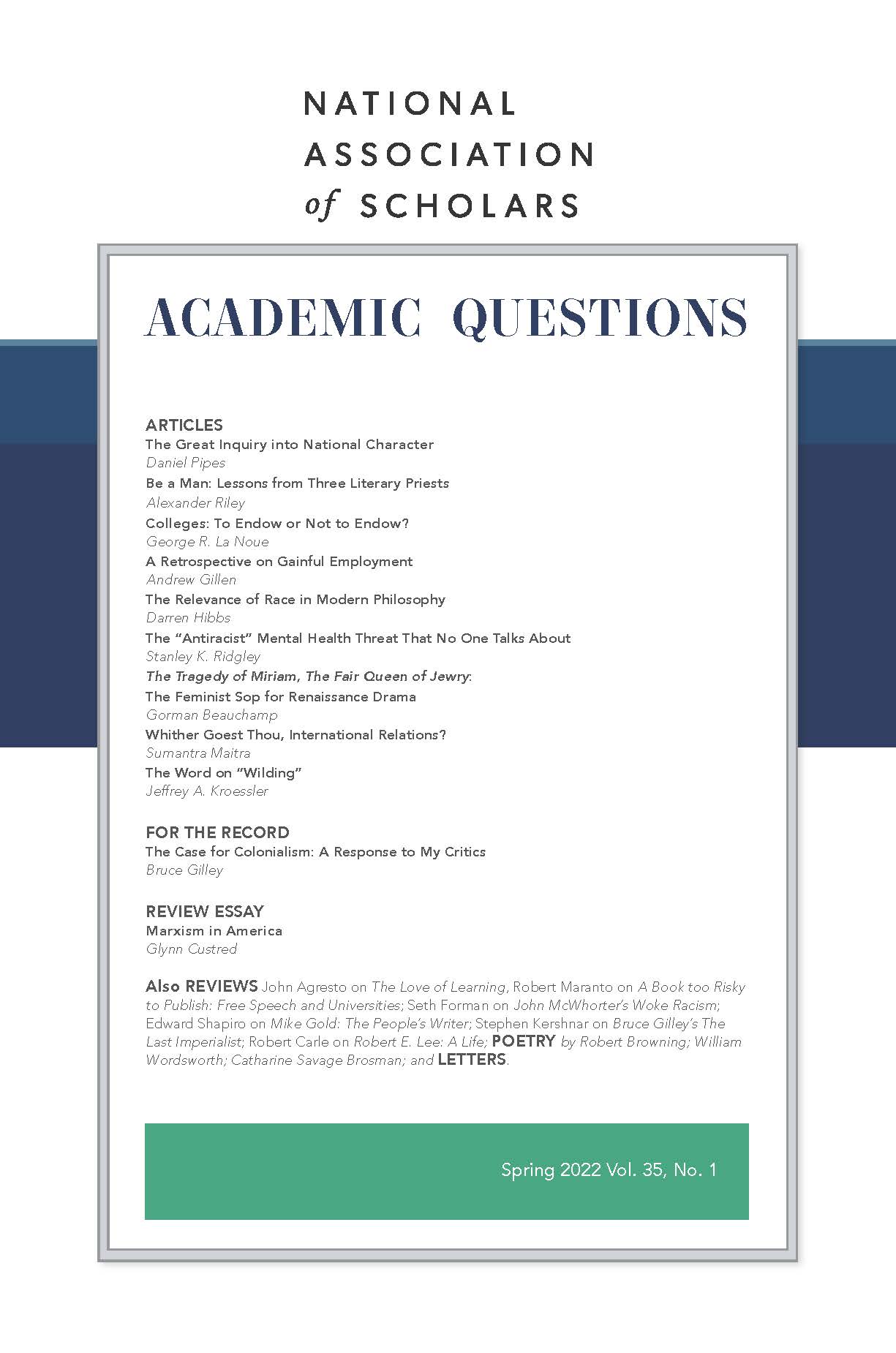ARTICLES
The Great Inquiry into National Character
Daniel Pipes, Middle East Forum, Campus Watch
At the tail end of humanity’s greatest wars, mid-twentieth-century psychologists, sociologists, anthropologists, political scientists, and others set about discovering “national character,” the grand search for cultural mores that might explain the behavior of nation states. These efforts ran aground, writes historian Daniel Pipes, as social scientists ignored the most important catalyst for the actions of nation-states: history.
Be a Man: Lessons from Three Literary Priests
Alexander Riley, Bucknell University
Twentieth-century novelists Graham Greene and William Peter Blatty provide portraits of three literary priests possessed of precisely those masculine traits that a vibrant culture needs in abundance, but which are too often derided as “toxic masculinity.”
Colleges: To Endow or Not to Endow?
George R. La Noue, University of Maryland Baltimore County
As colleges and universities undergo rapid institutional change and ideological capture, George R. La Noue believes it is imperative that donors ask three questions before entering into endowment agreements.
A Retrospective on Gainful Employment
Andrew Gillen, Texas Public Policy Foundation
The set of regulations known as “Gainful Employment” are designed to hold higher education programs accountable for student loan debt by establishing debt-to-income thresholds. Andrew Gillen evaluates the approach used by regulators to help policymakers develop the next iteration of accountability for higher education.
The Relevance of Race in Modern Philosophy
Darren Hibbs, Halmos College of the Arts and Sciences, Nova Southeastern University
Should the racial views of great thinkers from centuries past enter into modern evaluations of their work? Philosophy professor Darren Hibbs addresses this question and suggests a model for how the currently unpalatable views of philosophical luminaries should be approached in scholarship and in the classroom. Each discrete doctrine must be scrutinized to determine the relevance of the author's view on race.
The “Antiracist” Mental Health Threat That No One Talks About
Stanley K. Ridgley, LeBow College of Business, Drexel University
Despite an explosion of diversity, equity, and inclusion training in higher education, the “antiracist pedagogy” that conveys these ideas to undergraduates amounts to little more than a program of coercive thought reform that deploys psychological weapons against students.
The Tragedy of Miriam, The Fair Queen of Jewry:
The Feminist Sop for Renaissance Drama
Gorman Beauchamp, University of Michigan
Academic feminists go to some pretty strange lengths to ensure that female “writers” are well-represented in the literary canon of the Renaissance. Gorman Beauchamp considers the strange case of Elizabeth Cary’s The Tragedy of Miriam, The Fair Queen of Jewry.
Whither Goest Thou, International Relations?
Sumantra Maitra, The Center for the National Interest
Once a narrowly defined, career-oriented discipline designed to train future diplomats in the classic works of history and statesmanship, International Relations has fallen prey to many of the academic enthusiasms of the day.
Jeffrey A. Kroessler, John Jay College of Criminal Justice
Like earlier reference works such as World Book and Collier’s, digital reference works are used by students and researchers seeking accurate and trustworthy information. Unfortunately, databases such as Gale EBooks reflect the bias and social justice activism of the academic journals, newspapers, and magazines they draw from.
FOR THE RECORD
The Case for Colonialism: A Response to My Critics
Bruce Gilley, Portland State University
Political scientist and NAS board member Bruce Gilley’s article “The Case for Colonialism” (republished in Academic Questions in the summer of 2018), has been the subject of countless critical essays, conference panels, seminar discussions, and journal articles. Here Gilley responds to his critics.
REVIEW ESSAY
Glynn Custred, California State University, East Bay
Anthropologist Glynn Custred provides the context for the arrival of two books by big-name conservatives exploring the history of leftist politics in the United States.












